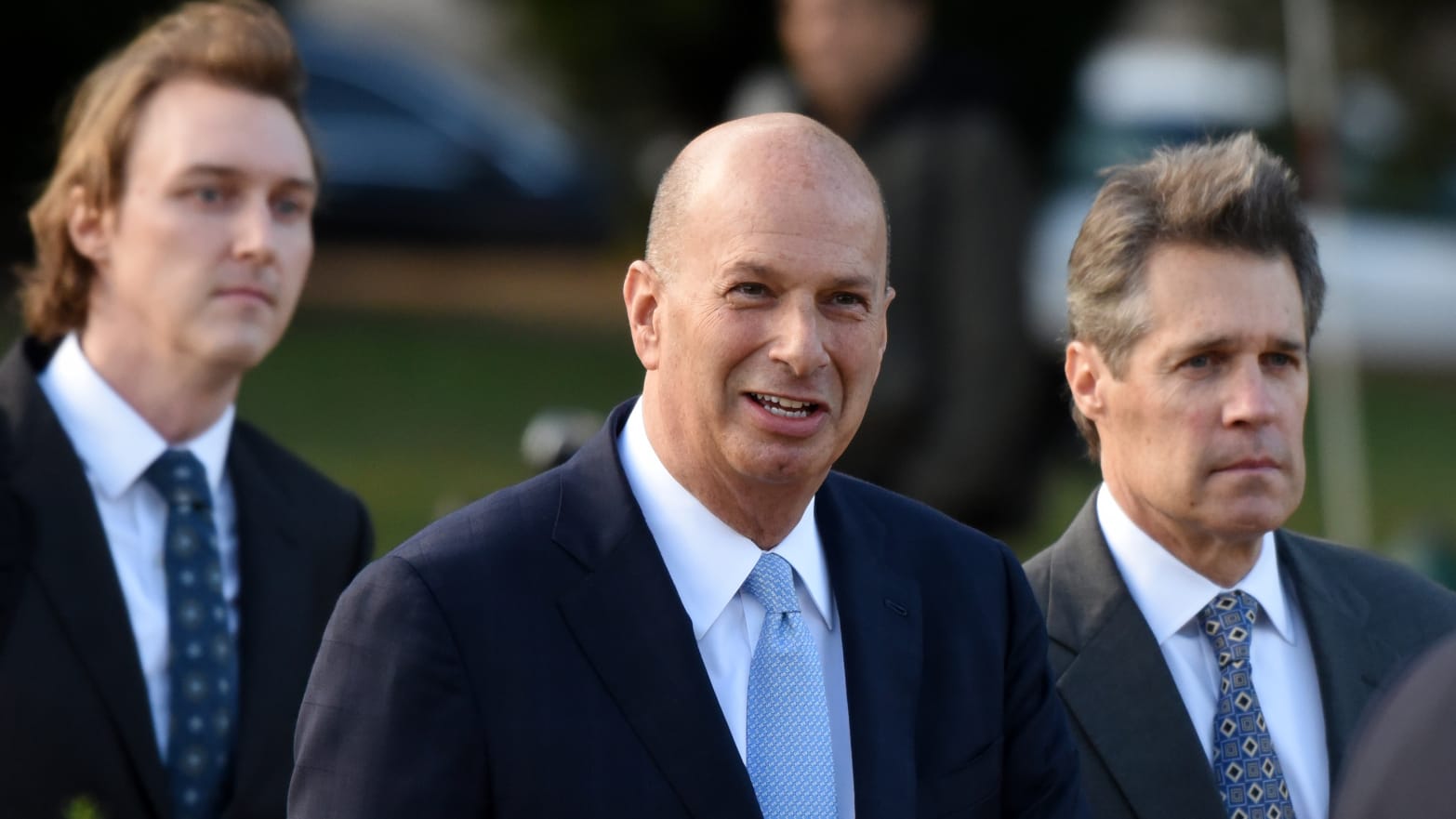Gordon Sondland can remember things so clearly now.
The U.S. ambassador to the European Union edited his testimony to congressional investigators and now recalls that he told Ukrainian officials they should announce anti-corruption investigations if they wanted to get the U.S. military aid they were promised. That’s according to a transcript of his deposition released Tuesday, which makes it clear that the targets of the investigation were meant to include the company that employed Hunter Biden, the son of one of President Donald Trump’s main political rivals.
Sondland first emerged as a key character in the Ukraine saga when the president’s personal attorney, Rudy Giuliani, told The Daily Beast in September that there was another individual, besides former top diplomat to Ukraine Kurt Volker, with whom he had spoken about Ukraine investigating 2020 presidential candidate Joe Biden and his son Hunter.
His reversal was revealed in the most recent tranche of testimonies released by congressional investigators after weeks of closed-door interviews with former and current Trump administration officials with knowledge of the president’s alleged attempt to withhold critical aid to Ukraine in order to force an investigation into his political adversaries.
Volker’s testimony was also released on Tuesday.
Sondland, who previously said the aid came without strings attached, said that after reading testimony from other impeachment investigation witnesses he freshly recalled details from a conversation with Andriy Yermak, an aide to Ukrainian President Volodymyr Zelensky, in which strings were discussed.
“I now recall speaking individually with Mr. Yermak, where I said that resumption of U.S. aid would likely not occur until Ukraine provided the public anti-corruption statement that we had been discussing for many weeks,” he said.
The discussions Sondland referenced included pressure from Rudy Giuliani that any statement from the Ukrainians mention Burisma, a natural gas company linked to Biden.
Sondland’s updated testimony represents a potential turning point in the impeachment proceedings, as the president and his allies have denied anything resembling a quid pro quo. And when he testified to Congress last month, Sondland indicated that he never had reason to believe the Ukrainians needed to meet any preconditions to receive the military support.
“And you had never thought there was a precondition to the aid. Is that correct?” asked a Republican staffer who questioned him, according to a newly released transcript of the testimony.
“Never, no,” Sondland replied at the time. “I mean, I was dismayed when it was held up, but I didn't know why.”
“So to the extent there were any preconditions to anything, it was perhaps with the White House meeting, but not the aid?” the staffer asked.
“I wasn’t aware of it or I wasn’t–I don't recall being aware of it,” Sondland replied.
In the update to his testimony, however, Sondland said he wasn’t aware of “any credible explanation” for the hold-up, and thus assumed “that the aid suspension had become linked to the proposed anti-corruption statement.”
“I recall hearing multiple reasons why the aid was being held from various people,” Sondland said in his original testimony. “I never heard that it was being held specifically to investigate the Bidens. I never heard the word ‘Biden’ mentioned with aid.”
On Nov. 1, The Daily Beast went to Sondland’s lawyer Robert Luskin at the law firm Paul Hastings with reporting that his client had made substantive and material changes to his testimony and sent a letter addressing those changes to the committee. In a request for comment about whether that sourcing was accurate, Luskin said, “That is not accurate.” On Tuesday, The Daily Beast asked Luskin why he had said Sondland did not submit a “letter.” He said his client had not submitted his changes to the committees until after The Daily Beast’s conversation.
A source familiar with the matter told The Daily Beast that following press statements by Sondland’s representatives that “appeared intended to revise and recast parts” of the ambassador’s testimony, the House Intelligence Committee reached out to Luskin. The committee told Sondland’s counsel about the proper procedure for submitting an addendum to his testimony if the ambassador wished to do so. Sondland and his lawyer reviewed the transcript in the days after but did not submit the addendum until Monday.
Both Sondland’s and Volker’s accounts also shed more light on the amount of influence Giuliani had over U.S.-Ukrainian relations, with both telling investigators not even Secretary of State Mike Pompeo could curb his role in Ukraine policy.
Volker told investigators that Giuliani was at the root of Trump’s view that Ukraine was a “corrupt” country filled with “terrible people.”
“I explained it to President Zelensky and the Chief of Presidential Administration, Andriy Bohdan, [who] was standing next to him,” Volker said. “And I explained that I thought that there is a negative narrative about Ukraine that is counteracting all the good things that he is doing, and that we are officially communicating back, and that this is being amplified by Rudy Giuliani.”
Sondland said any attempts to oust Giuliani were futile.
Asked if had ever talked to Pompeo about Giuliani’s involvement, Sondland said they discussed “that he's involved in affairs. And Pompeo rolled his eyes and said, ‘Yes, it's something we have to deal with’.”
Asked whether there was any effort to remove Giuliani from the process, Sondland said, “My speculation is yes, that they hit a brick wall when it came to getting rid of Mr. Giuliani.”
Volker also attested to Pompeo’s relative powerlessness when it came to the president’s lawyer.
“I'm sure [Pompeo] could have called Rudy Giuliani, but would Rudy Giuliani stop doing what he's doing because the Secretary of State calls him? I'd be surprised,” he said.
The EU ambassador attended several meetings now under scrutiny by House Democrats, including a meeting at the White House with President Trump, Volker and Perry. As the team debriefed the president about their trip to Kyiv for Zelensky’s inauguration, Trump told Sondland and the others that he “was skeptical that Ukraine was serious about reforms and anti-corruption,” Sondland said in his testimony. “And he directed those of us present at the meeting to talk to Mr. Giuliani … about his concerns.”
“We were faced with a choice: Abandon the goal of a White House meeting for President Zelensky… or we could do as President Trump directed and talk to Mr. Giuliani to address the President’s concerns. We chose the latter path,” Sondland said.
But he noted several times throughout his testimony that it wasn’t until “much later” that he realized Giuliani’s agenda might have included an effort to convince Ukraine to investigate the Bidens. Sondland repeatedly dodged questions about the subject in his testimony.
In his revised statement, Sondland did not address other apparent inconsistencies in his testimony. Other witness depositions indicate that Sondland knew about the connection between a Zelensky meeting and Ukraine agreeing to investigate Biden as early as July.
For example, on July 10, Sondland attended a meeting with Trump with former National Security Adviser John Bolton, Volker, Lt. Col. Alexander Vindman, and representatives of the National Security Council and Defense, including Chairman Oleksandr Danylyuk where he pressed the Ukrainians to adhere to Trump’s demands in exchange for a Zelensky visit to the White House.
“Ambassador Sondland started to speak about Ukraine delivering specific investigations in order to secure the meeting with the President, at which time Ambassador Bolton cut the meeting short,” Vindman said in his opening statement last week.
And William Taylor, the top diplomat to Ukraine, said in his opening statement that Sondland was aware of Trump’s desire to push for a Biden investigation in Ukraine because Trump had told the ambassador that Zelensky needed to say something about the investigation in public.
In his opening statement Sondland tried to distance himself from the “three amigos,” saying it was Perry and Volker who took the lead reaching out to Giuliani about arranging a face-to-face meeting between Trump and Zelensky. In general, Sondland said, he viewed himself playing an “advisory” role when it came to issues regarding Ukraine.
“I viewed my role as adding value to the broader efforts of the Ukraine team,” Sondland said in his opening statement, adding that all of his work on Ukraine had the “blessing” of Pompeo and that the secretary told him he was “doing great work.” “He encouraged me to keep banging away,” Sondland said.



